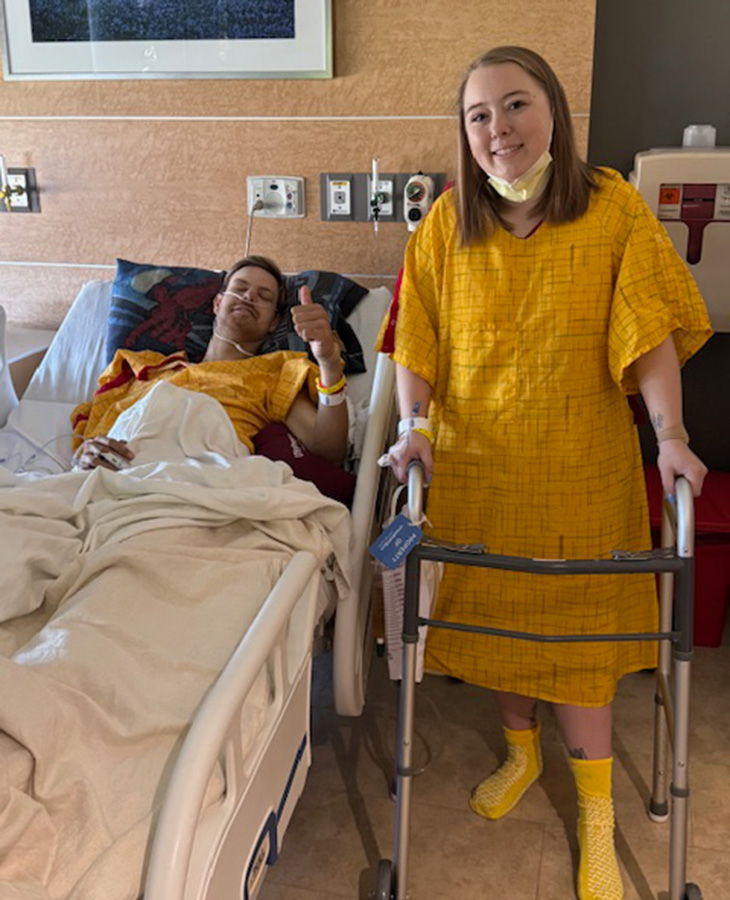
Sharing is caring: OSU alumna donates kidney to fiance
Friday, May 2, 2025
Media Contact: Jordan Bishop | Editor, Department of Brand Management | 405-744-7193 | jordan.bishop@okstate.edu
When Oklahoma State University graduate Clayton Hare began experiencing unexplained illness in early 2024, he never imagined it would lead to kidney failure, or that his fiancée and fellow OSU alum, Alex Phillips, would give a piece of herself to save him.
“I was shocked by the number of people reaching out to my parents and me about where to sign up to donate,” said Hare, who graduated from OSU in 2022 with a degree in sports management. “But I was more at a loss for words when I found out Alex was a match.”
Hare’s health problems began with persistent nausea and vomiting that multiple urgent care visits failed to diagnose. Despite high blood pressure readings that doctors attributed to white coat syndrome, no blood work was ordered.
By June 2024, his symptoms had worsened significantly.
“Every day, he was really sick,” Phillips said. “I said, ‘This is not normal. We need to go to the doctor.’”
A gastroenterologist suspected acid reflux but noted it was unusual for adults to experience vomiting with that condition. Still, no blood tests were performed, and an endoscopy procedure two months later showed nothing concerning despite a nurse warning about Hare’s dangerously high blood pressure.
It wasn’t until August 2024 that a primary care physician ordered comprehensive blood work, revealing catastrophic kidney failure. The next day, Hare received an urgent call.
“The doctor told him to go to the ER immediately because his kidneys were failing,” said Phillips, who earned both bachelor’s and master’s degrees in psychology and mental health counseling from OSU.
At the hospital, nephrologists were stunned by Hare’s creatinine level, a measure of kidney function where a normal level is under 1.0, which registered at 24, indicating just 2% of kidney function remaining.
“These are the kinds of numbers you see once every five years,” the kidney specialist told them.
Doctors diagnosed Hare with IgA Nephropathy, an autoimmune disease that attacks the kidneys. The condition can remain dormant for 10 to 15 years before causing noticeable damage, which explained why Hare, a young and seemingly healthy individual, had no prior warning signs.
“It was definitely a moment of happiness and peace. He’s alive. I’m alive. All our
monitors are beeping correctly.”
After a week in the hospital, Hare began peritoneal dialysis while multiple family members and friends underwent testing to determine transplant compatibility. Phillips and Hare’s sister emerged as the most compatible donors.
“I never thought we weren't close, but dealing with all this information and having her as a support system when things got stressful brought us even closer,” Hare said.
Phillips didn't hesitate to volunteer, though she approached the decision thoughtfully.
“I trusted my body and the doctors and our medical team completely,” Phillips said. “When you go through traumatic experiences, I’m very much a person who thinks, ‘OK, what's next?’ Let’s logic our way through this.”
Their surgeries took place in March 2025. Phillips underwent a two-hour laparoscopic procedure with a small incision to remove her kidney. Hare’s three-and-a-half-hour surgery involved placing the donated kidney in his lower abdomen, leaving his non-functioning native kidneys in place.
“Technically, I have three kidneys now,” Hare said. “Only one working, but three kidneys.”
Hours after surgery, Phillips visited Hare’s recovery room. Though both were groggy from anesthesia, Hare reached for her hand when he heard her voice, which is a moment Phillips treasures.
“It was definitely a moment of happiness and peace,” Phillips said. “He’s alive. I’m alive. All our monitors are beeping correctly.”
One month post-surgery, Hare’s creatinine level has improved to 1.8, which is still elevated but significantly better than before. Phillips is nearly back to her normal activity level after the initial difficult week of recovery.
Throughout their journey, the couple discovered they weren’t alone. They noticed another OSU-linked couple in the O’Colly who faced the exact diagnosis and transplant situation.
Both graduates now advocate for proactive health care and increased awareness of living organ donation.
“For this circumstance with his kidney function, transplant is the No. 1 treatment,” Phillips said. “Dialysis can only do so much.”
Phillips takes pride in knowing her donation had a double impact.
“The doctors told me, ‘You saved two lives today with your one kidney,’” Phillips said. “‘His and someone else’s who will now receive a kidney that Clayton would have taken from the deceased donor list.’”
The couple, who continue to recover while planning their wedding, emphasize the importance of medical advocacy.
“If you’re sick and doctors aren’t giving you answers, ask them to draw your blood,” Hare said. “And even young people should get blood work done.”
Story By: Mak Vandruff | makenzie.vandruff@okstate.edu
